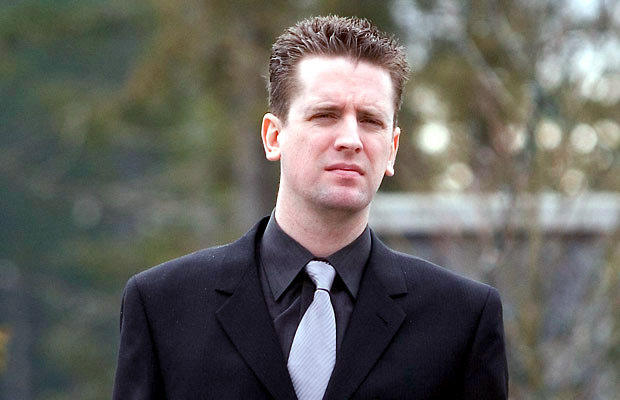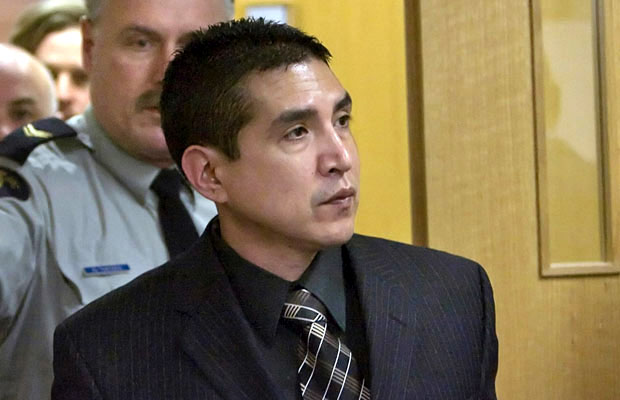Suspended B.C. RCMP officers
being paid up to $1.3 million a year
Ethan Baron, Vancouver Province, Sept. 12, 2010
Const. Trent Richards, who has received at least $265,000 in pay
since being suspended in January, 2007, for repeatedly having sex while on the job.
Photo: Debra Brash, Postmedia News Service/Victoria Times Colonist.
Cpl. Benjamin “Monty” Robinson is shown leaving a Braidwood Inquiry hearing in 2009.
On a separate matter involving a Tsawwassen traffic death, Robinson has been suspended
with pay and charged with obstruction of justice.
Photo: Andy Clark, Reuters.
Mountie Trent Richards used his red serge uniform and “hot cop” cachet to entice women into having sex with him while he was on the job.
Ordered to resign for engaging in on-duty sex on 15 or 16 occasions, the Vancouver Island officer appealed the ruling. He has been receiving full pay — at least $265,000 so far — since he was suspended from work in January 2007.
Richards is not alone. There are now 16 B.C. RCMP members on paid suspension for alleged misconduct.
Officers can remain suspended with pay for years — even receiving annual raises — as their cases go through internal-discipline and court processes.
“It’s a reward for engaging in inappropriate conduct,” said Simon Fraser University criminologist Robert Gordon.
The 10 constables, four corporals, one sergeant and one staff-sergeant on paid suspension are costing the public, in total, between $81,000 and $108,000 a month in salaries, or $970,000 to $1.3 million a year, according to pay scales provided by the B.C. RCMP.
“This just shows a fundamental lack of accountability to taxpayers,” says Maureen Bader, spokeswoman for the Canadian Taxpayers Federation. “The government’s obviously got to speed up the process.”
Only one B.C. Mountie — Vancouver-based Const. Vernon Wilson, before the courts on multiple charges from two alleged 2009 drunk-driving incidents — is suspended without pay.
Stoppage of pay “will only be invoked in extreme circumstances when it would be inappropriate to pay a member,” the RCMP Administration Manual says. Unpaid suspension will be considered if the Mountie is in jail awaiting trial or is “clearly involved” in the commission of an offence that is illegal or contravenes the force’s code of conduct, the manual says.
Across Canada, 47 Mounties were on paid suspension as of March 31, the Ottawa Citizen’s Chris Cobb reports.
Const. Kulwant Singh Malhi of the RCMP’s B.C. drug section was arrested in October 2007 after an unmarked police car rear-ended a Honda Civic in Richmond.
Malhi, a 10-year veteran of the force who was off-duty when the smash-up occurred, was charged with impaired driving, dangerous driving and hit-and-run. He was suspended with pay on Dec. 20, 2007, says B.C. RCMP spokeswoman Cpl. Annie Linteau.
Malhi has remained on paid suspension for almost three years because the RCMP disciplinary process usually isn’t concluded until after court proceedings are finished, Linteau says. Malhi’s criminal trial is scheduled to begin next month.
Cpl. Benjamin (Monty) Robinson crashed his Jeep into an intoxicated motorcyclist at a Tsawwassen intersection in October 2008. The Mountie, who was off duty, left the scene with his two children in the vehicle, and returned to fail a breathalyzer test. He later claimed he’d departed the crash site to go home and take two shots of vodka.
Prosecutors laid an obstructing-justice charge, citing lack of evidence of impaired driving. Robinson — who Linteau says has been suspended with pay since Oct. 28, 2008 — has a hearing set for next April to confirm a trial date.
At his disciplinary hearing, Const. Richards filed a statement accepting responsibility for his misconduct.
While at work in the small, rural Shawnigan Lake detachment, he visited Internet dating sites and had posted a picture of himself in his red serge uniform. In one post, he asked: “Up for sex with a hot cop?” In an email he said, “I’d be willing to use my cuffs.” He had on-the-job sex with four different women, continuing his escapades even after being told he was under a code-of-conduct investigation.
In February 2008, the RCMP disciplinary board ordered him to resign within 14 days. But because the decision must be provided in writing and served, it wasn’t until July 2008 that Richards was formally notified of the board’s decision, Linteau says. Then he appealed to the RCMP commissioner, triggering another process.
Richards’ internal appeal went first to the RCMP Professional Standards and External Review Directorate, which in October 2008 sent a report to the RCMP External Review Committee. A year and eight months later, that committee issued findings and recommendations to RCMP Commissioner William Elliott. The matter is still before Elliott, who was not available for comment.
“What [the RCMP] should be doing is looking at their process and figuring out how to move things along more smartly,” says SFU’s Gordon, who adds that B.C.’s slow court system magnifies the problem when criminal charges are involved.
Elliott told the Ottawa Citizen’s Chris Cobb in April that the RCMP’s disciplinary system moved at a “glacial” pace.
“It is far too slow,” he said. “It is far too cumbersome and far too legalistic. We need to streamline that process and speed it up.”
More about disgraced B.C. RCMP officers drawing full pay
Go to News and Comment page

